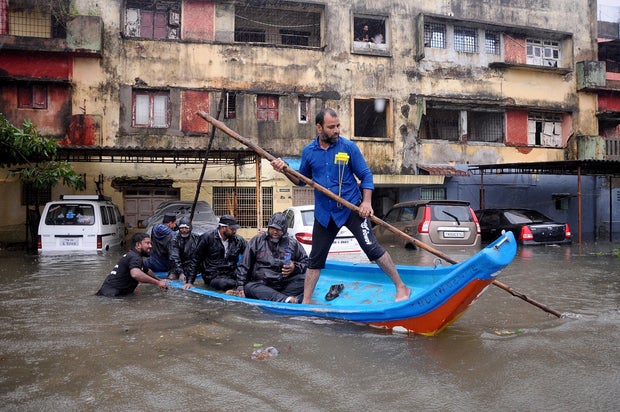New Delhi — Cyclone Michaung plowed into India’s east coast on Tuesday afternoon as a severe cyclonic storm, bringing heavy rainfall and high winds that were blamed for at least 17 deaths. Authorities evacuated thousands of people from coastal areas over the preceding days as Michaung churned over the Bay of Bengal in a bid to reduce casualties.
The 17 deaths were confirmed by police in the major city of Chennai, which is the capital of a state by the same name that was hit by flooding sparked by downpours on Monday as the cyclone neared India’s shoreline
Michaung, which means strength and resilience, made landfall between Nellore and Kavali in the south Indian state of Andhra Pradesh, which nieghbors Chennai, at about 1 p.m. local time. The storm had sustained winds of 55-60 miles per hour, with more powerful gusts, India’s national weather agency said.
Authorities in Andhra Pradesh state had evacuated more than 9,500 people from coastal areas to 211 relief camps set up in safer areas, they said.
AP Photo
Heavy rains inundated low-lying areas in the state and high winds brought down trees and power and communication lines, causing widespread outages and disruptions. The extent of the damage was not immediately clear.
“Extremely heavy rainfall will continue in Andhra Pradesh. The storm will weaken into a depression by Wednesday morning,” Mrutyunjay Mohapatra, director general of India’s Met weather department said.
Before it made landfall, Cyclone Michaung caused widespread chaos in the neighboring state of Tamil Nadu, where its capital city, Chennai, was swamped on Monday.
STRINGER/REUTERS
The first eight deaths were reported Monday, blamed on rain-related incidents in Chennai — including one person who died of electrocution and two others killed by a falling tree. The rains inundated most parts of the city and largely paralyzed life for its roughly 12 million people, sweeping cars down streets and submerging its airport.
The airport resumed operations Tuesday morning after the rain stopped and the waterlogged runway was cleared.
Teams from India’s National Disaster Response Force (NDRF) carried out rescue operations in several flooded areas along the coast, as Andhra Pradesh put all eight of its coastal districts on high alert.
Schools, colleges and many offices remained closed Tuesday across much of the state.
The warm waters of the Bay of Bengal have spawned several deadly cyclones over the past few years, causing massive destruction in both India and Bangladesh.
In 2020, Cyclone Amphan killed at least 80 killed people in India and left thousands homeless. In 2019, Cyclone Fani claimed at least 89 lives and displaced millions in Odisha, another coastal Indian state. In 1999, a super cyclone killed about 10,000 people as it slammed into Odisha.
Scientists have linked the rising frequency and intensity of cyclones in the Bay of Bengal with global warming.



